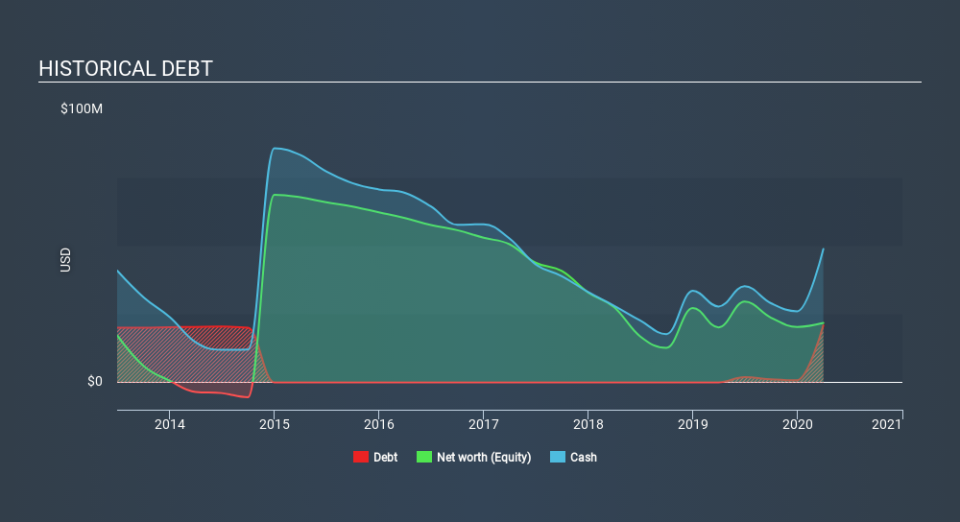Does Rockwell Medical (NASDAQ:RMTI) Have A Healthy Balance Sheet?

The external fund manager backed by Berkshire Hathaway's Charlie Munger, Li Lu, makes no bones about it when he says 'The biggest investment risk is not the volatility of prices, but whether you will suffer a permanent loss of capital. It's only natural to consider a company's balance sheet when you examine how risky it is, since debt is often involved when a business collapses. We can see that Rockwell Medical, Inc. (NASDAQ:RMTI) does use debt in its business. But the more important question is: how much risk is that debt creating?
What Risk Does Debt Bring?
Debt and other liabilities become risky for a business when it cannot easily fulfill those obligations, either with free cash flow or by raising capital at an attractive price. Ultimately, if the company can't fulfill its legal obligations to repay debt, shareholders could walk away with nothing. However, a more frequent (but still costly) occurrence is where a company must issue shares at bargain-basement prices, permanently diluting shareholders, just to shore up its balance sheet. Of course, the upside of debt is that it often represents cheap capital, especially when it replaces dilution in a company with the ability to reinvest at high rates of return. When we examine debt levels, we first consider both cash and debt levels, together.
See our latest analysis for Rockwell Medical
What Is Rockwell Medical's Debt?
You can click the graphic below for the historical numbers, but it shows that as of March 2020 Rockwell Medical had US$20.9m of debt, an increase on US$10.0, over one year. However, its balance sheet shows it holds US$48.9m in cash, so it actually has US$28.0m net cash.
How Strong Is Rockwell Medical's Balance Sheet?
According to the last reported balance sheet, Rockwell Medical had liabilities of US$13.4m due within 12 months, and liabilities of US$31.7m due beyond 12 months. Offsetting these obligations, it had cash of US$48.9m as well as receivables valued at US$4.59m due within 12 months. So it can boast US$8.39m more liquid assets than total liabilities.
This short term liquidity is a sign that Rockwell Medical could probably pay off its debt with ease, as its balance sheet is far from stretched. Simply put, the fact that Rockwell Medical has more cash than debt is arguably a good indication that it can manage its debt safely. When analysing debt levels, the balance sheet is the obvious place to start. But it is future earnings, more than anything, that will determine Rockwell Medical's ability to maintain a healthy balance sheet going forward. So if you want to see what the professionals think, you might find this free report on analyst profit forecasts to be interesting.
In the last year Rockwell Medical had negative earnings before interest and tax, and actually shrunk its revenue by 3.7%, to US$62m. We would much prefer see growth.
So How Risky Is Rockwell Medical?
Statistically speaking companies that lose money are riskier than those that make money. And we do note that Rockwell Medical had negative earnings before interest and tax (EBIT), over the last year. Indeed, in that time it burnt through US$30m of cash and made a loss of US$33m. But at least it has US$28.0m on the balance sheet to spend on growth, near-term. Even though its balance sheet seems sufficiently liquid, debt always makes us a little nervous if a company doesn't produce free cash flow regularly. There's no doubt that we learn most about debt from the balance sheet. However, not all investment risk resides within the balance sheet - far from it. Take risks, for example - Rockwell Medical has 2 warning signs we think you should be aware of.
Of course, if you're the type of investor who prefers buying stocks without the burden of debt, then don't hesitate to discover our exclusive list of net cash growth stocks, today.
Love or hate this article? Concerned about the content? Get in touch with us directly. Alternatively, email editorial-team@simplywallst.com.
This article by Simply Wall St is general in nature. It does not constitute a recommendation to buy or sell any stock, and does not take account of your objectives, or your financial situation. We aim to bring you long-term focused analysis driven by fundamental data. Note that our analysis may not factor in the latest price-sensitive company announcements or qualitative material. Simply Wall St has no position in any stocks mentioned. Thank you for reading.



